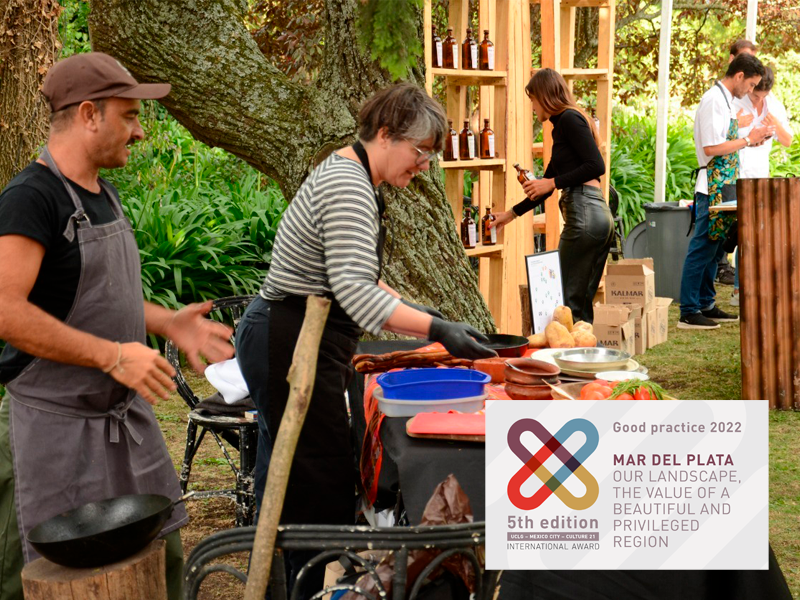Our landscape, the value of a beautiful and privileged land
1. Mar del Plata and culture
Mar del Plata was founded as a port for the export of leather and jerky in 1865. In 1879, the Municipality (called Partido in Argentina) of General Pueyrredon was created and Mar del Plata became the main city, and later grew to become a regional centre.
Food production is intrinsic to the cultural identity of the General Pueyrredon Partido, as a result of its great diversity of resources and landscapes. The migrations that built up the fruit and vegetable belt, their residences, ranches, and rural establishments produced diverse cuisine and a significant gastronomic sector.
The city is a meeting place, a place for socializing, vacationing, conferences, and conventions that are enriched by the contribution of local cultural actors and those from other parts of the country. It is also characterized by its use of cultural, recreational, and educational spaces, clubs, neighbourhood cultural centres, and museums, as well as open and public spaces including squares, beaches, and coves.
The goal of the program is to foster the development of citizenship through education, dissemination, and promotion programs, around its productive periurban landscape.
2. Project goals and implementation
2.1. Main goal and specific objectives
The overall goal of the program is to foster the development citizenship around its productive periurban landscape, through education, dissemination, and promotion programs that encourage integration, the expression of diversity, entrepreneurship and training in sustainable production, a triple impact economy, and the exercise of cultural rights in public spaces.
2.2. Project development
“Our landscape, the value of a beautiful and privileged region” is made up of various stages:
First, to promote knowledge of the cultural heritage of the Municipality of General Pueyrredon (MGP) and its landscape, which is viewed as a common good. Virtual and face-to-face cycles will be carried out at the Municipal Historical Museum Archive “R.T. Barili” in which various topics will be addressed, including the history of the landscape and its agricultural dimension. The ongoing program aims to keep an audiovisual record of the content produced in order to incorporate everything into the museum’s collection and that of the MGP’s Department of Culture.
Second, to establish links with leaders in local gastronomy that incorporate an experience in which chefs use products from local fisherman and from the fruit and vegetable belt of the Municipality of General Pueyrredon. The history of the recipes of the different communities and Indigenous peoples would also be incorporated, provoking a celebratory encounter through the flavours, colours, and aromas of the cuisine. Entrepreneurs of sustainably produced craft beverages, beer, and gin will also participate. The cycle aims to lead to the ongoing exchange of ideas between small-scale agriculture and livestock producers, organic production, hydroponics, and local chefs, while hosting informative talks and tastings.
Thirdly, institutions such as the Horticulturists’ Cooperative provide information on storage and marketing in order to advise on how to manage production surpluses, within the framework of the triple impact economy.
The program¡s approach supports and strengthens spaces for reflection provided by the municipality, the private sector, and tertiary sector organizations that work together to provide tools to the local government.
3. Impacts
3.1. Direct impacts
Under this program, the local government hopes to create a central pillar in the city’s production matrix, permanently supporting initiatives that favour development through various programs. For 2020 in particular, the pandemic significantly affected economic activity, production commercialization, access to primary consumer goods, and more. Therefore, different measures were implemented by the Ministry of Production to respond to this situation.
Furthermore, the program’s approach supports and strengthens spaces for reflection provided by the municipality, the private sector, and tertiary sector organizations that work together to provide tools to the local government.
The culture and cultural actors throughout the city and the region clearly reflect a global commitment to establishing teamwork relationships, exploring new paths and trends, promoting experiences in food collection, production, and marketing, as well as to explore new developments in excellent local gastronomy.
On a broader scale, the program opens the door to learning about and reflecting on working conditions in certain rural sectors, the role of women in production communities, the triple impact economy, the circular economy, food recovery by the Food Bank Network, and the work carried out in markets, especially the historic Fruit and Vegetable Market Cooperative.
3.2. Key factors
One of the program’s essential strengths is its promotion of meetings around food production, gastronomy, and Indigenous and local community cuisine. Additionally, the program attempts to understand and pay homage to the pioneers and inhabitants whose hard work established the region’s production matrix. They have given helped craft its identity, its economy, and its development, further proving that heritage and landscape are the roots of every city by offering potential and creativity.
The program opens the door to learning about and reflecting on working conditions in certain rural sectors, the role of women in production communities, the tripe impact economy, the circular economy, food recovery, and the work carried out in markets.
4. Further information
Mar del Plata (Municipality of General Pueyrredon / General Pueyrredon Partido) was a candidate for the fifth UCLG Mexico City – Culture 21 International Award (February - June 2022). The jury for the award drew up its final report in September of 2022, and requested that the UCLG Committee on Culture promote this project as one of the good practices implemented under Agenda 21 for culture.
This report was written by Carlos Balmaceda, Secretary of Culture for General Pueyrredon Partido, Mar del Plata (Municipality of General Pueyrredon), Province of Buenos Aires, Argentina.
Contact: cultura (at) mardelplata.gob.ar
Website: www.mardelplata.gob.ar
